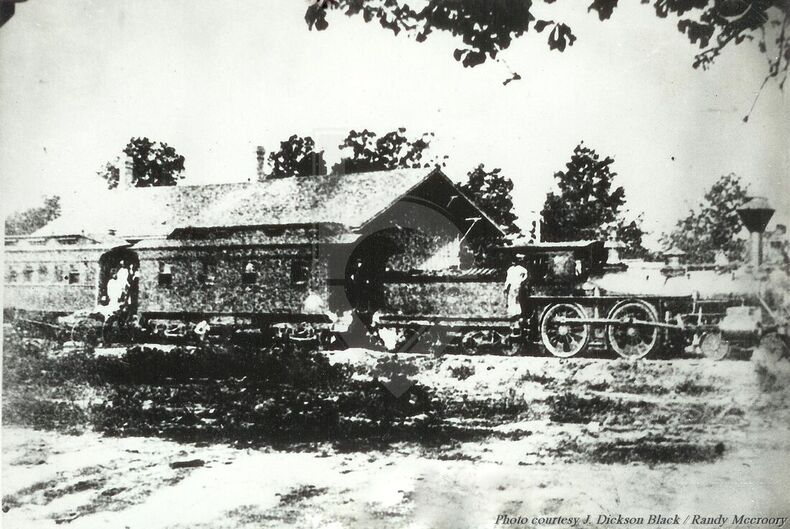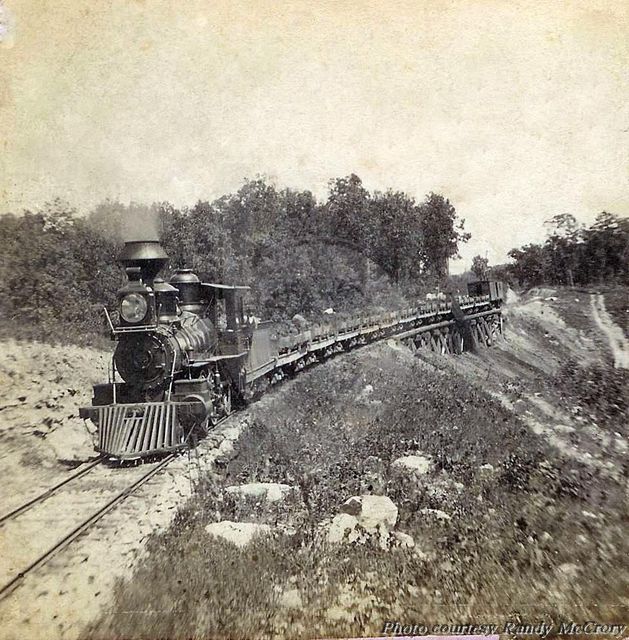The Bentonville Railroad and the Frisco Branch
By Tom Duggan
The failed Northwest Arkansas project did attract the attention of the Frisco as its Executive Committee meeting of December 21, 1878 discussed the threat of other railroads building in Northwest Arkansas.
In the first weeks of April 1880 Frisco surveyors departed Peirce City, Missouri to lay out a route to Northwest Arkansas and Texas. The General Manager of the Frisco thought the new line would promote future long haul freight business to Texas. A second reason was the abundance of hardwood suitable for railroad ties. Joseph Seligman, a Frisco director, like the potential for passenger traffic to the new resort of Eureka Springs, Arkansas near the Frisco's proposed Arkansas line. Due to state charter requirements, the Arkansas line had two names, The St. Louis, Arkansas & Texas of Missouri and the St. Louis, Arkansas & Texas of Arkansas. The Frisco owned both corporations and later merged them into the Frisco in 1882. Having just built the Kansas Division from Oswego, Kansas to Wichita, Kansas the Frisco had crews of experienced men available. The Frisco also wanted to eliminate other railroads as potential competitors in Northwest Arkansas. The railroad selected a route that entered Northwest Arkansas at Garfield, Arkansas. This route provided the least difficult route and reduced the need for bridges or extensive excavation. The decision in favor of the easterly route through Garfield, Arkansas killed Bentonville's hope of having a railroad.
In April 1880 Captain Charles W. Rogers, Frisco General Manager, and Frisco President Edward Winslow visited Fayetteville to learn more about the service area of the new line. During the visit, Captain Rogers said he hoped to start rail service to Fayetteville by January 1, 1881. Grading of the segment from Plymouth, Missouri to Garfield, Arkansas was complete by early August 1880. That same month the engineering corps reached Fayetteville. Grading contracts were negotiated for an additional ten miles in Arkansas. A month later the Mayor of Springdale, Arkansas reported the new line was in service to Avoca, Arkansas. He observed that few Benton County landowners were willing to donate or sell land for the railroad. This caused many land condemnation hearings at the Bentonville courthouse. Grading also proceeded north and south of Springdale, Arkansas with the last gap being the segment between Bloomington (now called Lowell, Arkansas) and Avoca, Arkansas. Work gangs soon closed the gap and the Frisco train reached Rogers, named for the Frisco's General Manager Charles Warrington Rogers on May 10, 1881.
Service to Fayetteville commenced Monday, June 8, 1881. Captain Rogers' Fayetteville reception was spirited with a crowd of ten thousand present. At the celebration dinner, the participants drank thirteen toasts. Captain Rogers. a Union naval officer in the Civil War, climbed a tower of the Arkansas Industrial University (now Old Main Building of the University of Arkansas) to peer westward to Indian country. There is no record of what he said, if anything.
In 1880 events took place that suggests Bentonville made a desperate effort to be on the Frisco's Arkansas line. On April 21, 1880, the Bentonville Democrat carried a cryptic item that directors of an unnamed railroad were to meet the next month to consider a southward extension to Bentonville. Several months passed without news. In October and November of 1880, surveyors made a preliminary railroad survey from Bentonville to Neosho, Missouri, by way of Pineville, Missouri. The survey conductor was a General Randall of the Lexington & Southern Railroad Company, a part of railroad financier Jay Gould's Missouri Pacific Railroad Company since August of 1880. The survey by a Gould controlled railroad line may have been an unsuccessful effort intended to force the Frisco to include Bentonville on the Arkansas line.
Over the years several stories surfaced about Bentonville's loss of the railroad. The most amusing claims that the Frisco sent surveyors to Bentonville. When they arrived in town to do a preliminary survey they met two drunken city officials. The tipsy officials demanded that the surveyors pay a fee to make the survey. The surveyors left town without paying the fee and Bentonville was not included on the railroad. A second story is that the Frisco asked Bentonville to provide a $15,000 subsidy to have the line pass through Bentonville. The city refused to provide the subsidy. In retaliation, the Frisco routed the line to Rogers. The truth is much more mundane. B. F. Sikes, the man who donated land to the Frisco to found Rogers, Arkansas in 1881, was interviewed on the twentieth anniversary of the founding of Rogers. He commented that the Frisco bypassed Bentonville, as the easterly route was easier to build. A second reason was Rogers had springs that could provide water for railroad locomotives.
In the first weeks of April 1880 Frisco surveyors departed Peirce City, Missouri to lay out a route to Northwest Arkansas and Texas. The General Manager of the Frisco thought the new line would promote future long haul freight business to Texas. A second reason was the abundance of hardwood suitable for railroad ties. Joseph Seligman, a Frisco director, like the potential for passenger traffic to the new resort of Eureka Springs, Arkansas near the Frisco's proposed Arkansas line. Due to state charter requirements, the Arkansas line had two names, The St. Louis, Arkansas & Texas of Missouri and the St. Louis, Arkansas & Texas of Arkansas. The Frisco owned both corporations and later merged them into the Frisco in 1882. Having just built the Kansas Division from Oswego, Kansas to Wichita, Kansas the Frisco had crews of experienced men available. The Frisco also wanted to eliminate other railroads as potential competitors in Northwest Arkansas. The railroad selected a route that entered Northwest Arkansas at Garfield, Arkansas. This route provided the least difficult route and reduced the need for bridges or extensive excavation. The decision in favor of the easterly route through Garfield, Arkansas killed Bentonville's hope of having a railroad.
In April 1880 Captain Charles W. Rogers, Frisco General Manager, and Frisco President Edward Winslow visited Fayetteville to learn more about the service area of the new line. During the visit, Captain Rogers said he hoped to start rail service to Fayetteville by January 1, 1881. Grading of the segment from Plymouth, Missouri to Garfield, Arkansas was complete by early August 1880. That same month the engineering corps reached Fayetteville. Grading contracts were negotiated for an additional ten miles in Arkansas. A month later the Mayor of Springdale, Arkansas reported the new line was in service to Avoca, Arkansas. He observed that few Benton County landowners were willing to donate or sell land for the railroad. This caused many land condemnation hearings at the Bentonville courthouse. Grading also proceeded north and south of Springdale, Arkansas with the last gap being the segment between Bloomington (now called Lowell, Arkansas) and Avoca, Arkansas. Work gangs soon closed the gap and the Frisco train reached Rogers, named for the Frisco's General Manager Charles Warrington Rogers on May 10, 1881.
Service to Fayetteville commenced Monday, June 8, 1881. Captain Rogers' Fayetteville reception was spirited with a crowd of ten thousand present. At the celebration dinner, the participants drank thirteen toasts. Captain Rogers. a Union naval officer in the Civil War, climbed a tower of the Arkansas Industrial University (now Old Main Building of the University of Arkansas) to peer westward to Indian country. There is no record of what he said, if anything.
In 1880 events took place that suggests Bentonville made a desperate effort to be on the Frisco's Arkansas line. On April 21, 1880, the Bentonville Democrat carried a cryptic item that directors of an unnamed railroad were to meet the next month to consider a southward extension to Bentonville. Several months passed without news. In October and November of 1880, surveyors made a preliminary railroad survey from Bentonville to Neosho, Missouri, by way of Pineville, Missouri. The survey conductor was a General Randall of the Lexington & Southern Railroad Company, a part of railroad financier Jay Gould's Missouri Pacific Railroad Company since August of 1880. The survey by a Gould controlled railroad line may have been an unsuccessful effort intended to force the Frisco to include Bentonville on the Arkansas line.
Over the years several stories surfaced about Bentonville's loss of the railroad. The most amusing claims that the Frisco sent surveyors to Bentonville. When they arrived in town to do a preliminary survey they met two drunken city officials. The tipsy officials demanded that the surveyors pay a fee to make the survey. The surveyors left town without paying the fee and Bentonville was not included on the railroad. A second story is that the Frisco asked Bentonville to provide a $15,000 subsidy to have the line pass through Bentonville. The city refused to provide the subsidy. In retaliation, the Frisco routed the line to Rogers. The truth is much more mundane. B. F. Sikes, the man who donated land to the Frisco to found Rogers, Arkansas in 1881, was interviewed on the twentieth anniversary of the founding of Rogers. He commented that the Frisco bypassed Bentonville, as the easterly route was easier to build. A second reason was Rogers had springs that could provide water for railroad locomotives.
A history making train - It was the arrival of the above Frisco passenger train on May 10, 1881, that gave Rogers a birthday. Old No. 17 was the first to run over new tracks into Rogers.
This is an image of of an 1880s stereoview of the Avoca trestle The railroad would build a trestle then would fill dirt in around it.


